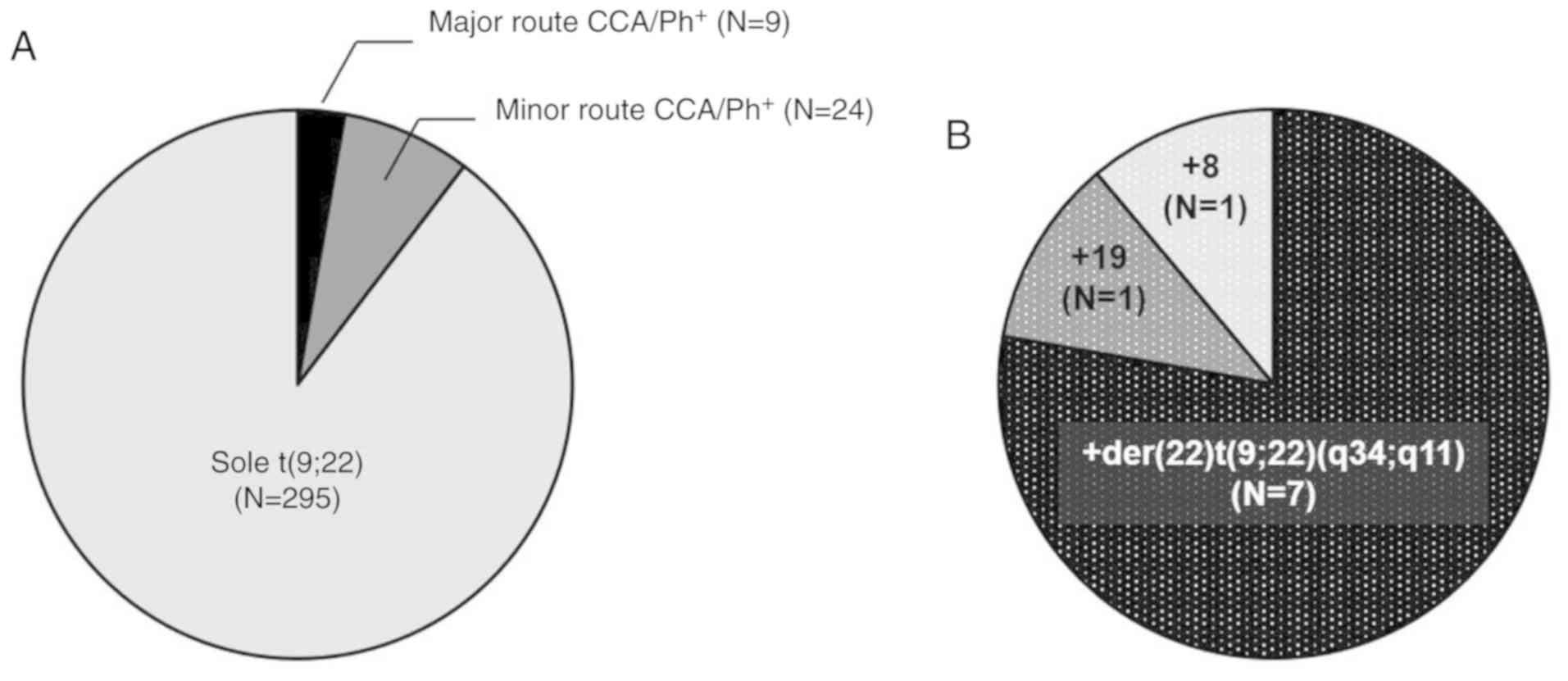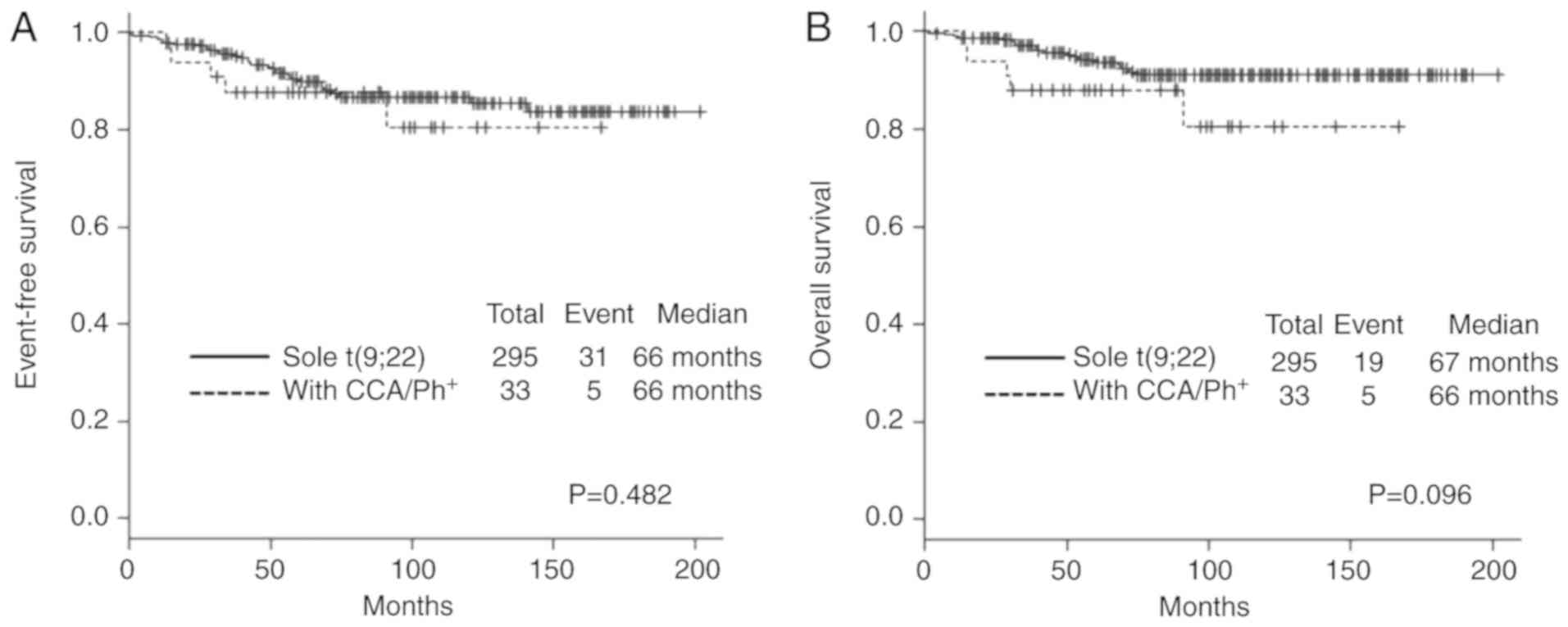|
1
|
Hochhaus A, Larson RA, Guilhot F, Radich
JP, Branford S, Hughes TP, Baccarani M, Deininger MW, Cervantes F,
Fujihara S, et al: Long-term outcomes of imatinib treatment for
chronic myeloid leukemia. N Engl J Med. 376:917–927. 2017.
View Article : Google Scholar : PubMed/NCBI
|
|
2
|
Kizaki M, Takahashi N, Iriyama N, Okamoto
S, Ono T, Usui N, Inokuchi K, Nakaseko C, Kurokawa M, Sumi M, et
al: Efficacy and safety of tyrosine kinase inhibitors for newly
diagnosed chronic-phase chronic myeloid leukemia over a 5-year
period: Results from the Japanese registry obtained by the New
TARGET system. Int J Hematol. 109:426–439. 2019. View Article : Google Scholar : PubMed/NCBI
|
|
3
|
Tauchi T, Kizaki M, Okamoto S, Tanaka H,
Tanimoto M, Inokuchi K, Murayama T, Saburi Y, Hino M, Tsudo M, et
al: Seven-year follow-up of patients receiving imatinib for the
treatment of newly diagnosed chronic myelogenous leukemia by the
TARGET system. Leuk Res. 35:585–590. 2011. View Article : Google Scholar : PubMed/NCBI
|
|
4
|
Sasaki K, Strom SS, O'Brien S, Jabbour E,
Ravandi F, Konopleva M, Borthakur G, Pemmaraju N, Daver N, Jain P,
et al: Prospective analysis: Relative survival in patients with
chronic myeloid leukemia in chronic phase in the era of tyrosine
kinase inhibitors. Lancet Haematol. 5:e186–e193. 2015. View Article : Google Scholar
|
|
5
|
Mitelman F: The cytogenetic scenario of
chronic myeloid leukemia. Leuk Lymphoma 11:. (Suppl 1):S11–S15.
1993. View Article : Google Scholar
|
|
6
|
Baccarani M, Deininger MW, Rosti G,
Hochhaus A, Soverini S, Apperley JF, Cervantes F, Clark RE, Cortes
JE, Guilhot F, et al: European LeukemiaNet recommendations for the
management of chronic myeloid leukemia: 2013. Blood. 122:872–884.
2013. View Article : Google Scholar : PubMed/NCBI
|
|
7
|
Fabarius A, Leitner A, Hochhaus A, Müller
MC, Hanfstein B, Haferlach C, Göhring G, Schlegelberger B,
Jotterand M, Reiter A, et al: Impact of additional cytogenetic
aberrations at diagnosis on prognosis of CML: long-term observation
of 1,151 patients from the randomized CML study IV. Blood.
118:6760–6768. 2011. View Article : Google Scholar : PubMed/NCBI
|
|
8
|
Luatti S, Castagnetti F, Marzocchi G,
Baldazzi C, Gugliotta G, Iacobucci I, Specchia G, Zanatta L,
Rege-Cambrin G, Mancini M, et al: Additional chromosomal
abnormalities in Philadelphia-positive clone: Adverse prognostic
influence on frontline imatinib therapy: A GIMEMA Working Party on
CML analysis. Blood. 120:761–767. 2012. View Article : Google Scholar : PubMed/NCBI
|
|
9
|
Lee SE, Choi SY, Bang JH, Kim SH, Jang EJ,
Byeun JY, Park JE, Jeon HR, Oh YJ, Kim M and Kim DW: The long-term
clinical implications of clonal chromosomal abnormalities in newly
diagnosed chronic phase chronic myeloid leukemia patients treated
with imatinib mesylate. Cancer Genet 205:. 205:563–571. 2012.
View Article : Google Scholar
|
|
10
|
Fabarius A, Kalmanti L, Dietz CT, Lauseker
M, Rinaldetti S, Haferlach C, Göhring G, Schlegelberger B,
Jotterand M, Hanfstein B, et al: Impact of unbalanced minor route
versus major route karyotypes at diagnosis on prognosis of CML. Ann
Hematol. 94:2015–2024. 2015. View Article : Google Scholar : PubMed/NCBI
|
|
11
|
Kantarjian H, Shah NP, Hochhaus A, Cortes
J, Shah S, Ayala M, Moiraghi B, Shen Z, Mayer J, Pasquini R, et al:
Dasatinib versus imatinib in newly diagnosed chronic-phase chronic
myeloid leukemia. N Engl J Med. 362:2260–2270. 2010. View Article : Google Scholar : PubMed/NCBI
|
|
12
|
Saglio G, Kim DW, Issaragrisil S, le
Coutre P, Etienne G, Lobo C, Pasquini R, Clark RE, Hochhaus A,
Hughes TP, et al: Nilotinib versus imatinib for newly diagnosed
chronic myeloid leukemia. N Engl J Med. 362:2251–2259. 2010.
View Article : Google Scholar : PubMed/NCBI
|
|
13
|
Iriyama N, Tokuhira M, Takaku T, Sato E,
Ishikawa M, Nakazato T, Sugimoto KJ, Fujita H, Fujioka I, Hatta Y,
et al: Incidences and outcomes of therapy-related chronic myeloid
leukemia in the era of tyrosine kinase inhibitors: Surveillance of
the CML Cooperative Study Group. Leuk Res. 54:55–58. 2017.
View Article : Google Scholar : PubMed/NCBI
|
|
14
|
Cross NC, White HE, Müller MC, Saglio G
and Hochhaus A: Standardized definitions of molecular response in
chronic myeloid leukemia. Leukemia. 26:2172–2175. 2012. View Article : Google Scholar : PubMed/NCBI
|
|
15
|
Nakamae H, Yoshida C, Miyata Y, Hidaka M,
Uike N, Koga D, Sogabe T, Matsumura I, Kanakura Y and Naoe T: A new
diagnostic kit, ODK-1201, for the quantitation of low major BCR-ABL
mRNA level in chronic myeloid leukemia: Correlation of quantitation
with major BCR-ABL mRNA kits. Int J Hematol. 102:304–311. 2015.
View Article : Google Scholar : PubMed/NCBI
|
|
16
|
Kanda Y: Investigation of the freely
available easy-to-use software ‘EZR’ for medical statistics. Bone
Marrow Transplant. 48:452–458. 2013. View Article : Google Scholar : PubMed/NCBI
|
|
17
|
Nakazato T, Iriyama N, Tokuhira M,
Ishikawa M, Sato E, Takaku T, Sugimoto KJ, Fujita H, Fujioka I,
Kimura Y, et al: Incidence and outcome of second malignancies in
patients with chronic myeloid leukemia during treatment with
tyrosine kinase inhibitors. Med Oncol. 35:992018. View Article : Google Scholar : PubMed/NCBI
|
|
18
|
Sasaki K, Kantarjian HM, O'Brien S,
Ravandi F, Konopleva M, Borthakur G, Garcia-Manero G, Wierda WG,
Daver N, Ferrajoli A, et al: Incidence of second malignancies in
patients with chronic myeloid leukemia in the era of tyrosine
kinase inhibitors. Int J Hematol. 109:545–552. 2019. View Article : Google Scholar : PubMed/NCBI
|
|
19
|
Sasaki K, Kantarjian H, O'Brien S, Ravandi
F, Konopleva M, Borthakur G, Garcia-Manero G, Wierda W, Daver N,
Ferrajoli A, et al: Prediction for sustained deep molecular
response of BCR-ABL1 levels in patients with chronic myeloid
leukemia in chronic phase. Cancer. 124:1160–1168. 2018. View Article : Google Scholar : PubMed/NCBI
|
|
20
|
Sato E, Iriyama N, Tokuhira M, Takaku T,
Ishikawa M, Nakazato T, Sugimoto KJ, Fujita H, Fujioka I, Asou N,
et al: Introduction of second-generation tyrosine kinase inhibitors
may reduce the prognostic impact of high-risk patients, according
to the European treatment and outcome study (EUTOS) score. Leuk
Lymphoma. 59:1105–1112. 2018. View Article : Google Scholar : PubMed/NCBI
|
|
21
|
Alhuraiji A, Kantarjian H, Boddu P,
Ravandi F, Borthakur G, DiNardo C, Daver N, Kadia T, Pemmaraju N,
Pierce S, et al: Prognostic significance of additional chromosomal
abnormalities at the time of diagnosis in patients with chronic
myeloid leukemia treated with frontline tyrosine kinase inhibitors.
Am J Hematol. 93:84–90. 2018. View Article : Google Scholar : PubMed/NCBI
|
|
22
|
Fujioka I, Takaku T, Iriyama N, Tokuhira
M, Kimura Y, Sato E, Ishikawa M, Nakazato T, Sugimoto KJ, Fujita H,
et al: Features of vascular adverse events in Japanese patients
with chronic myeloid leukemia treated with tyrosine kinase
inhibitors: A retrospective study of the CML Cooperative Study
Group database. Ann Hematol. 97:2081–2088. 2018. View Article : Google Scholar : PubMed/NCBI
|
|
23
|
Fabarius A, Duesberg P, Giehl M, Seifarth
W, Hochhaus A and Hehlmann R: Genomic instability in context of the
chromosomal theory. Cell Oncol. 30:503–504. 2008.PubMed/NCBI
|
|
24
|
Melo JV and Barnes DJ: Chronic myeloid
leukaemia as a model of disease evolution in human cancer. Nat Rev
Cancer. 7:441–453. 2007. View Article : Google Scholar : PubMed/NCBI
|
|
25
|
Skorski T: Genetic mechanisms of chronic
myeloid leukemia blastic transformation. Curr Hematol Malig Rep.
7:87–93. 2012. View Article : Google Scholar : PubMed/NCBI
|
















